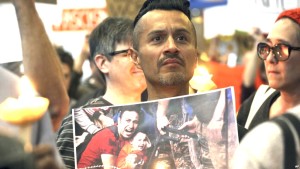Travel ban, Muslim ban, whatever Trump wants to call it, lawyers battling the executive orders on immigration fear the Philippines will be in an expanded iteration of countries subjected to “extreme vetting.”
The American Immigration Lawyers Association–which historically has had good ties to Congress and governmental agencies–has sent out a notice to its members with a warning about an executive order draft being circulated.
The draft is said to add “Egypt, Lebanon, Afghanistan, Pakistan, Colombia, Venezuela, southern Philippines, trans- Sahara (Mali), and the Sulu/Sulawesi seas littoral.”
John Trasvina, Dean of the University of San Francisco School of Law, says the fear that the list will expand is real and takes the notice seriously.
“I think people in the affected countries or people here who have family there are beginning to take notice and consider their options about future travel,” Trasvina told me.
Trasvina said that lawyers around the country focused on fighting the executive orders hope that the numerous lawsuits filed will stop the detaining of people.
“But the government has not been clear about all the travelers who were affected,” Trasvina said. “While lawyers believe that no one is detained, they just don’t know. Some people went back. Some people were held (detained) for long periods of time even after the order was issued. Lawyers had to meet with Border Patrol, US Marshals, US Attorneys, numerous times to get a clear answer as to whether the government felt the ruling applied nationwide and whether they would follow it.”
In San Francisco, the legal battle extends to fighting the threat to its status as a sanctuary city, an issue Trasvina is following closely.
“It’s a well-crafted lawsuit,” Trasvina said. “ It does not suggest that SF can ignore US immigration policy, nor does it attempt to give SF its own independent policy. It simply states that the federal government cannot tell SF how to deploy its police department or public health workers in its own city and that the federal government is a bad partner.”
By that, Trasvina means the city is not equipped or funded to do the feds enforcement job. The real fear is the potential liability if cities get it wrong in enforcing the law.
“If (the city) gets sued by people who should not be detained, the federal government is nowhere in sight to defend the lawsuit or pay the bills,” said Trasvina.
He added that San Francisco’s sanctuary suit simply aims to protect the city and put responsibility back on the feds.
Emil Guillermo is a veteran journalist and commentator based in Northern California. Contact at https://www.twitter.com/emilamok


